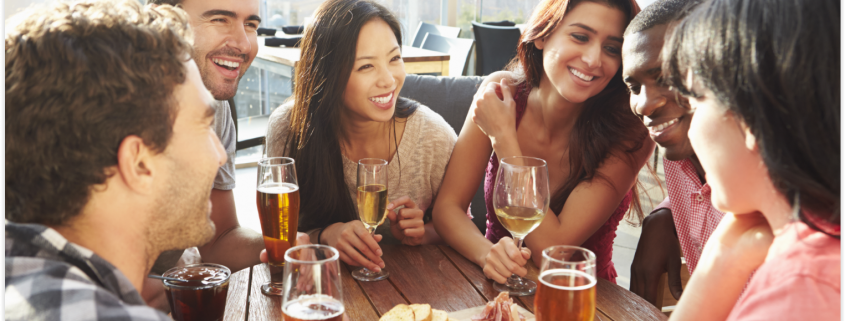BARE Shares – Loyalty, relationships drive consumers in the experience economy.
BARE International shares an article by Julia Russell for SmartBrief – Loyalty, relationships drive consumers in the experience economy.
‘The consumer landscape has evolved to be about much more than just consuming meals and buying groceries. The food and beverage landscape now exists within the experience economy. Today’s consumers care much more than their older counterparts about the experiences that come with consumption, which means restaurants and retailers must tap into that desire for experiences and bring the experience economy into their establishments.
The experience economy has emerged as part of the evolution of the customer experience, according to Andrew Park, senior director of customer experience strategy at customer experience management firm InMoment. As consumers increasingly seek experiences at restaurants and food retailers that go beyond simply eating a meal or purchasing food, companies have adjusted their focus to differentiate their brands and deliver exceptional customer experiences that meet the needs of their customers, he said.
Today’s consumers want to have relationships on an individual level with the brands they choose to spend their time and money with, Park said. The young consumer set wants to feel like their choices matter, and they want to build meaningful relationships with restaurants and retailers that they feel are connected with the community, that are relevant to them and that truly want to hear from their customers.
And at the end of the day, that path leads to loyalty, he said. Once restaurants and retailers go through the evolution of the customer experience and understand who their consumers are, they establish a position from which they can establish long-term relationships with their customers and foster an environment of deep loyalty.
At the crux of the experience economy is the understanding that not all consumers are the same, and they are not all looking for the same types of experiences, according to Park. He said truly capturing customers in today’s restaurant and food retail industries is about becoming a brand that consumers want to build relationships with and building business strategies that go beyond the transaction.
“It’s more about the environment, it’s more about connecting with friends and building those relationships with your friends as well as the brand itself,” he said.
A vital piece of today’s experience economy is data, Park said. Loyalty plays a huge role in establishing relationships with consumers that allow retailers and restaurants to collect meaningful data and then turn around and use that data to craft the experiences that their target customers want to have.
“It’s not just about going out and getting data,” he said. “It’s about finding the way that your consumer wants to engage with you and making it easy for them to do so.”
Smaller niche brands have a significant leg up when it comes to this aspect of the experience economy, Park said.
For example, New York’s Greenport Harbor Brewing Co. has established two distinctly different locations since it was founded eight years ago, HR/Controller Doug Gerowski said. He said the company’s smaller, original location has a “new wave” feel that features smaller-batch brews, while its larger facility carries the brewery’s full-time regular brews. The key to Greenport Harbor’s customer experience is thinking local, Gerowski said, which includes cultivating an “ultra-local” experience for consumers, using local hops and local ingredients at its restaurant and trying to create a great experiences with its beers and beyond.
Greenport Harbor focuses on offering its customers experiences that go beyond simply having a beer, from using different types to glasses to optimize the tasting experiences for each brew, to specially training their staff to educate customers about their products. The company holds art shows to support local artists and utilizes its green space by offering lawn games and live music, according to Gerowski. The brewery has even hosted a dock jumping competition for dogs and a barbecue pit masters competition.
“Any event that can create a little excitement, give people a new reason to come and visit us, and at the same time always making sure that we have the beer in good condition ready for them to enjoy,” he said.
And at the end of the day, for Greenport Harbor the focus is creating a full brand experience that keeps customers coming back to its facilities, looking for ways to extend their experiences, Gerowski said.
Pizza chain Mellow Mushroom is another example of a brand that has used the experience economy to its benefit, according to Park of InMoment.
“If you’ve visited more than one [location], you’ve visited two completely different experiences,” he said.
Park said that Mellow Mushroom focuses on creating a local feel at its restaurants, and crafting experiences that really fit the cultures of their surrounding communities. Each location comes up with their own pizza recipes and choose different draft beers that cater to their local customers.
“They will use [InMoment’s] information to be able to understand at that very local level what those consumers are looking for,” he said.
When it comes to crafting these full brand experiences, technology has come a long way to equip restaurants and retailers to do so, according to Park. At InMoment, he and his colleagues help brands capture consumer feedback through social media and other listening posts and pull different external and internal data points to create a unique view of how they are interacting with their consumers and how their consumers view the brands. And while technology is key to understanding how to craft the best retail and restaurant experiences for today’s consumers, it can pose a challenge to find the right balance between automation and streamlining within a business and finding human touchpoints through which brands can engage with consumers, he said.
“You have to shore up the basics to make sure that you’re delivering a great experience first and then use that information and use the credibility you’ve built with your customer base to then start understanding that customer base and how you can differentiate,” Park said.’
***
From fast food to gourmet fine dining establishments, BARE customer feedback programs, like our mystery guest visits can identify the key drivers at your establishment that are encouraging customer satisfaction and revisit intent. We will customize the following services to develop innovative solutions for you:
– Mystery Guest Visits
– Restaurant and bar integrity audits
– Phone Calls to Measure Reservation and Menu Knowledge
– Facility Audits to Assess Appearance and Cleanliness
– Guest Satisfaction Surveys: In person, by phone, email or on the web
Actionable program feedback gives management teams critical areas on which to focus to improve your organization’s overall performance. This in turn will allow your organization to provide clear expectations and achievement goals that will drive employee engagement.
To solidify ourselves as established global leaders in the Restaurant Customer Experience Measurement industry, we have performed over 100,000 visits worldwide in over 150 countries and 25 languages. What’s more we have an incredible 99.2% client satisfaction rate.
Let BARE International support your business by providing a complimentary consultation today.











